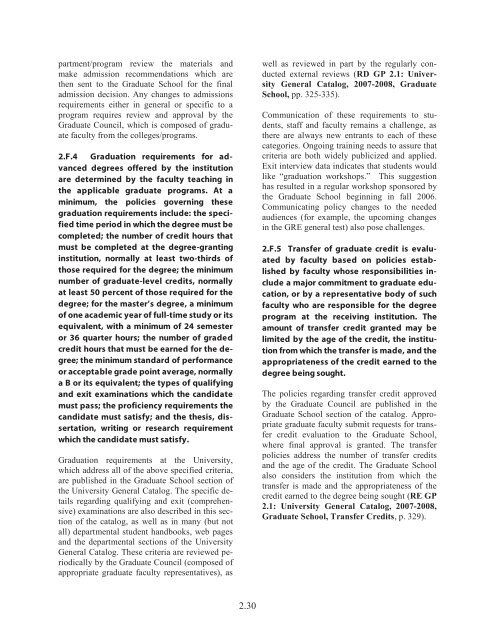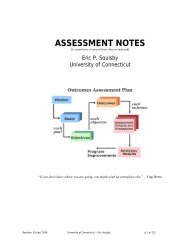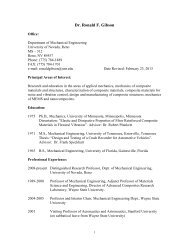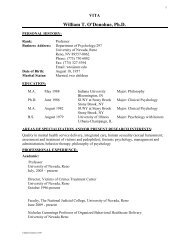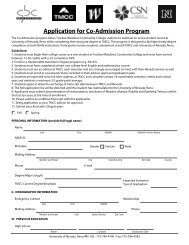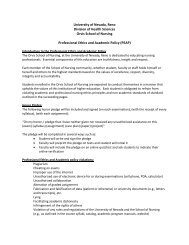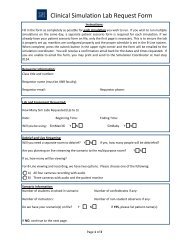2007 Self-Study - University of Nevada, Reno
2007 Self-Study - University of Nevada, Reno
2007 Self-Study - University of Nevada, Reno
You also want an ePaper? Increase the reach of your titles
YUMPU automatically turns print PDFs into web optimized ePapers that Google loves.
partment/program review the materials and<br />
make admission recommendations which are<br />
then sent to the Graduate School for the final<br />
admission decision. Any changes to admissions<br />
requirements either in general or specific to a<br />
program requires review and approval by the<br />
Graduate Council, which is composed <strong>of</strong> graduate<br />
faculty from the colleges/programs.<br />
2.F.4 Graduation requirements for advanced<br />
degrees <strong>of</strong>fered by the institution<br />
are determined by the faculty teaching in<br />
the applicable graduate programs. At a<br />
minimum, the policies governing these<br />
graduation requirements include: the specified<br />
time period in which the degree must be<br />
completed; the number <strong>of</strong> credit hours that<br />
must be completed at the degree-granting<br />
institution, normally at least two-thirds <strong>of</strong><br />
those required for the degree; the minimum<br />
number <strong>of</strong> graduate-level credits, normally<br />
at least 50 percent <strong>of</strong> those required for the<br />
degree; for the master’s degree, a minimum<br />
<strong>of</strong> one academic year <strong>of</strong> full-time study or its<br />
equivalent, with a minimum <strong>of</strong> 24 semester<br />
or 36 quarter hours; the number <strong>of</strong> graded<br />
credit hours that must be earned for the degree;<br />
the minimum standard <strong>of</strong> performance<br />
or acceptable grade point average, normally<br />
a B or its equivalent; the types <strong>of</strong> qualifying<br />
and exit examinations which the candidate<br />
must pass; the pr<strong>of</strong>iciency requirements the<br />
candidate must satisfy; and the thesis, dissertation,<br />
writing or research requirement<br />
which the candidate must satisfy.<br />
Graduation requirements at the <strong>University</strong>,<br />
which address all <strong>of</strong> the above specified criteria,<br />
are published in the Graduate School section <strong>of</strong><br />
the <strong>University</strong> General Catalog. The specific details<br />
regarding qualifying and exit (comprehensive)<br />
examinations are also described in this section<br />
<strong>of</strong> the catalog, as well as in many (but not<br />
all) departmental student handbooks, web pages<br />
and the departmental sections <strong>of</strong> the <strong>University</strong><br />
General Catalog. These criteria are reviewed periodically<br />
by the Graduate Council (composed <strong>of</strong><br />
appropriate graduate faculty representatives), as<br />
well as reviewed in part by the regularly conducted<br />
external reviews (RD GP 2.1: <strong>University</strong><br />
General Catalog, <strong>2007</strong>-2008, Graduate<br />
School, pp. 325-335).<br />
Communication <strong>of</strong> these requirements to students,<br />
staff and faculty remains a challenge, as<br />
there are always new entrants to each <strong>of</strong> these<br />
categories. Ongoing training needs to assure that<br />
criteria are both widely publicized and applied.<br />
Exit interview data indicates that students would<br />
like “graduation workshops.” This suggestion<br />
has resulted in a regular workshop sponsored by<br />
the Graduate School beginning in fall 2006.<br />
Communicating policy changes to the needed<br />
audiences (for example, the upcoming changes<br />
in the GRE general test) also pose challenges.<br />
2.F.5 Transfer <strong>of</strong> graduate credit is evaluated<br />
by faculty based on policies established<br />
by faculty whose responsibilities include<br />
a major commitment to graduate education,<br />
or by a representative body <strong>of</strong> such<br />
faculty who are responsible for the degree<br />
program at the receiving institution. The<br />
amount <strong>of</strong> transfer credit granted may be<br />
limited by the age <strong>of</strong> the credit, the institution<br />
from which the transfer is made, and the<br />
appropriateness <strong>of</strong> the credit earned to the<br />
degree being sought.<br />
The policies regarding transfer credit approved<br />
by the Graduate Council are published in the<br />
Graduate School section <strong>of</strong> the catalog. Appropriate<br />
graduate faculty submit requests for transfer<br />
credit evaluation to the Graduate School,<br />
where final approval is granted. The transfer<br />
policies address the number <strong>of</strong> transfer credits<br />
and the age <strong>of</strong> the credit. The Graduate School<br />
also considers the institution from which the<br />
transfer is made and the appropriateness <strong>of</strong> the<br />
credit earned to the degree being sought (RE GP<br />
2.1: <strong>University</strong> General Catalog, <strong>2007</strong>-2008,<br />
Graduate School, Transfer Credits, p. 329).<br />
2.30


